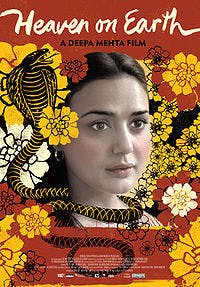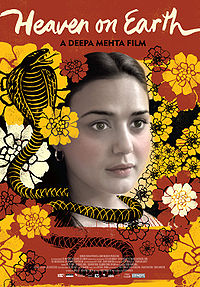Heaven on Earth by Deepa Mehta
Jan 21, 2015
First story


I just came back from seeing Heaven and Earth, Deepa Mehta's eighth film. Ever since I saw Fire, I've been hooked on DM's films. They're consistently against the grain, powerful, thoughtfully and lyrically executed. They address issues of class, gender, sexuality, culture, patriarchy, and (im)migration (or rather, issues of place and displacement) with I think a really balanced perspective. She's critical of "tradition" without condemning it, making room for an appropriate sense of reverence. Things are not as simple or transparent as you might think -- who's the victim, who's the villain. And she takes linear narratives for a loop.
Heaven on Earth is the story about a Punjabi woman, Chand, who leaves her family, the only world she's ever known, travels hundreds of miles to enter in to an arranged marriage to Rocky (mm hm, with a name like that, of course the marriage is doomed from the beginning right?) and live with his family in suburban Canada. I don't want to be a spoiler, but let's just say the scenes of domestic violence absolutely crushed my heart. Not that they were hyperbolic or gratuitous, but precisely because they were so unexaggerated and nonchalant. They were jarring (being what it is) yet blended in seamlessly with the film.
But what I liked about the film is the way it twists the immigrant story -- for whatever reasons that pushed Chand's family to choose this path for her, it is only after she's traveled from the colony (Third World) to the metropole (the First World) that her troubles begin, subverting any idea that immigration represents a linear path from barbarism to civility, anachronism to modernity, staunch patriarchy to some sort of Western feminist utopia. What Chand finds is, despite being a graduate, she can't find work other than in a factory among other hird world women. Her vivacious spirit, her imaginative mind suffocated in a house shared not just with Rocky and his parents, Rocky's sister and her husband and two children, but the house is "rented" to tenants who sleep there during the day. (That's a new one on me.)
And I like how Mehta allows complexity in her characters. While it would be easy and convenient to peg Rocky (and his mother) as the villain, you see his angst and inner turmoil. He too is trapped in a situation created out of circumstance and culture that is beyond his control. Torn between what he knows is wrong (I hope), and what is expected of him as an Indian man/husband and as his mother's son. There are moments you feel sorry for the guy, not that that excuses anything at all.
And just thinking about it now, it makes you think about the effects of this immigrant family drama on the two kids who have to witness not just the abuse, but everyone's complacency, no complicity, in the abuse. Will the little girl accept her fate as beautiful Punjabi bride? Will the boy grow up to hit his wife too? Will they eventually turn their back on their culture, their family? Would you blame them if they did?
I haven't even gotten into the magical realism and how Mehta weaves the Cobra myth into the film. Is Chand just off her rocker, or was it a coping mechanism to survive the extremely traumatic conditions? And the metaphor of the snake for desire... Pretty cool. There's so many layers to the film (and I'm clearly not a film critic), but I'm getting tired now. So goodnight for now, maybe some other day I'll look back and dig deeper. :)




